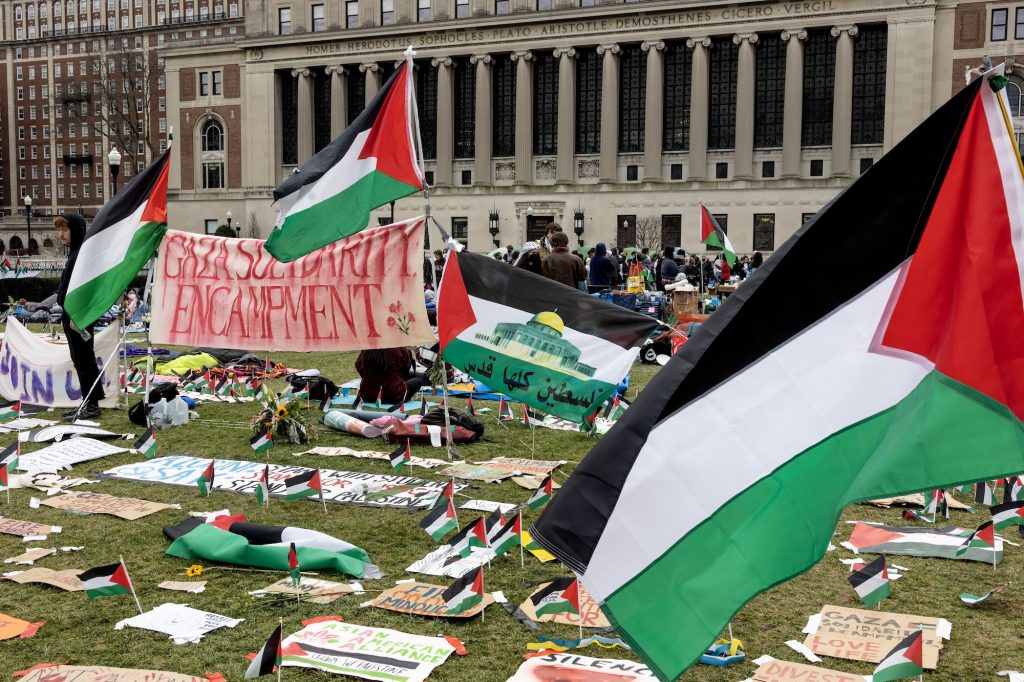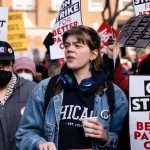Students at Columbia University have occupied the university’s East Butler Lawn for nearly a week now, holding down what they’ve dubbed the Gaza Solidarity Encampment. Since this began, the university’s administration has ruthlessly repressed its student body, issuing dozens upon dozens of suspensions and ushering in the NYPD to arrest over 100 students.
These violent actions of the state have not gone unchecked — Gaza solidarity encampments have now sprung up across the nation, on campuses where students stand in defense of both Palestine and their fellow student activists at Columbia. Nearly every encampment has faced repression, although the degree varies. The most acute attacks since the initial Columbia arrests have come from Yale, where 47 students were arrested, and New York University, where faculty linked arms and surrounded their students to defend them from the NYPD. While the faculty staved off police repression for as long as possible, cops eventually deployed pepper spray against students and faculty, cleared the encampment, and made 120 arrests. More recently, Emerson College’s Gaza solidarity encampment was cleared by police, who arrested over 100 protesters.
These attacks on the democratic right to protest have sparked outrage and solidarity even from sectors that have not mobilized for Palestine. Faculty at universities who have remained silent on the question of Palestine are now showing solidarity as we haven’t seen in decades, staging walkouts, sickouts, and even a strike at the University of Texas at Austin. Unions that have not taken action against the genocide have now signed on to the Student Workers of Columbia Solidarity Pledge in defense of students and the right to protest. Swaths of people across the nation who have been passive or detached from the pro-Palestine movement are now taking notice and denouncing this repression.
Those leading the fight for Palestine have at times been skeptical of, or even averse to, support from those who have been silent for months, but it is strategically vital for the movement to embrace any and all solidarity in this moment of acute struggle. When facing the state and its various agents of repression, the pro-Palestine movement needs all the defense it can get.
The Case for a Broad Defense Campaign
These encampments ultimately have their roots in the movement for Palestine, but they are an important escalation of the struggle. This escalation has expanded to include the democratic rights to protest, free speech, and assembly. Naturally, defenders are now coming out of the woodwork — the further the state goes in its repression and violence, the more pushback its attacks are bound to receive. Now that the bipartisan regime has funded the genocide of Palestinians and waged such blatant attacks on the student movement, outrage and solidarity have poured in from two angles: Palestine supporters and defenders of the right to protest.
This puts the leaders and vanguard of the movement for Palestine in a new position. Waves of support have come from those who have been silent for months, and it has come only after students in the U.S. were attacked. On the surface, it may seem that accepting and inviting support from these sectors shifts the movement’s focus away from the genocide and instead centers the attacks on students, but this is far from true. When thinking of the movement as a battle with the state, it becomes clear that broad unity and solidarity against repression can do nothing but strengthen the movement.
There are two possible paths ahead: the movement can accept defense only from those who have been allies from the start, or it can embrace and invite the broadest-possible support, even from those who have been silent about genocide. Let us play out both possible scenarios, with a strategic eye toward strengthening the movement.
Down the first path, where solidarity is rallied only from longtime supporters, the movement stands only to weaken itself. While the fight against genocide has not ceased, the movement has begun to ebb — mobilizations have shrunk from tens of thousands mobilizing weekly to a smaller vanguard keeping the battle alive. The university encampments could reignite the spark of the Palestine movement, but the movement has been on the defensive for months, and it has less strength than it did in October and November. Already in a weakened position, the movement is pushing away solidarity from broad sectors, allowing the bipartisan regime’s attacks to go largely unchecked.
Imagine, for example, if the repression of the university encampments had sparked very little outrage. The state could easily arrest as many students as possible, clear every encampment, and station as many police and National Guard soldiers on campuses as it pleased. The already-vulnerable movement would be beaten down and repressed, its key leaders arrested, and its sights of struggle locked down. Even if we focus only on the movement’s goal of defending Palestine and ending the genocide — setting aside the attack on democratic rights — these goals are immensely more difficult to reach when a movement can be freely repressed by the state with no public outcry.
Down the second path, it may seem like the movement would be weakened by the focus on student repression, or that its perspective for a free Palestine would be brushed aside by the allyship of sectors that have not backed the movement so far. Precisely the opposite is true. An appeal for the broadest-possible support for student protesters facing repression stands to shift the balance of forces in favor of the movement for Palestine, rather than the state. A movement protected only by its own forces can more easily be snuffed out. A movement protected by broad sectors outside itself is undeniably stronger. If a broad defense comes to the pro-Palestine student movement not on the basis of support for Palestine but rather support for the right to protest, this defense still provides critical protection to the movement.
A movement defended by academics, journalists, artists, and other public figures is one not so easily crushed by the state. On this terrain, the movement for Palestine has its epicenters of struggle defended, its leaders remain in its ranks, and its vanguard is not fractured and fragmented. This gives the movement the power to rebuild and massify — to kindle the flame of recent new energy into a widespread flame for its cause. While all those denouncing the student repression of the last week may not denounce the genocide in Gaza, they nonetheless provide vital protection against state repression for those who do. This cover cannot be pushed away. While it is entirely true that political movements inevitably will, and must, go through processes of disagreement, clashing, and strategic differences across sectors that must be debated, defending against the state requires the utmost unity of all sectors — even sectors of the masses entirely outside the movement. The experience of support for the student struggle may also bring those previously outside the Palestinian liberation movement closer to it. That is, a common struggle may lead the less politicized to begin to question the role of the state and universities, and their ties to the apartheid state of Israel, or the bipartisan support for the repression of students.
A broad defense campaign against the attacks on the movement for Palestine — one that embraces any and all solidarity it is offered — strengthens the movement immensely, but also carries deeply important implications for the future of struggle. The last decade has seen no shortage of uprising. Without a doubt, movements against the injustices of the capitalist system will continue beyond this acute moment. A broad campaign in defense of the democratic rights to assembly and free speech not only strengthens the movement for Palestine, but it also helps prevent the development of a terrain wherein brutal attacks by the state go unchecked and become normalized. For the strength of the Palestine movement, for the democratic right to protest, and for the future of struggle, we must build the broadest-possible defense campaign against state repression. The bipartisan regime seeks to divide our forces — we must not let them.











